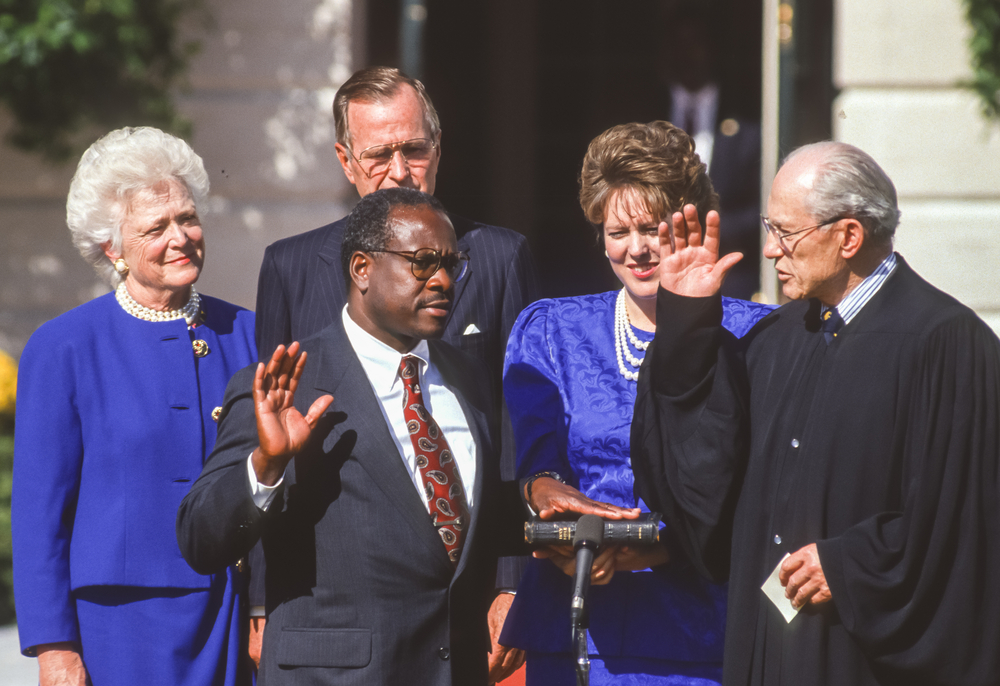The Desperate, Overdue Need For A Supreme Court Code Of Ethics

Justice Clarence Thomas, the most senior member of the Supreme Court, at his swearing in ceremony on October 18, 1991. CREDIT: Shutterstock/Rob Crandall
(Justice Clarence Thomas being sworn in)
Over the past several decades, radical social conservatives and corporate interests have worked to pack the Supreme Court with ideologues. Republican-appointed justices have colluded with these interests, poisoning both the decisions themselves and the public’s perception of our judicial branch. The Court is dismantling our democracy, and importantly, it is not even pretending to be impartial about it.
Case in point: On Friday, June 24, the Supreme Court overturned Roe v. Wade, stripping Americans of a cherished fundamental right relied on for nearly five decades. Using a selective and distorted reading of history, the Court insisted that lawmakers in the 18th and 19th centuries did not identify abortion as a right and that this somehow justified ruling that today in 2022, pregnant people are not allowed to make personal decisions about their bodies and health. The Court’s abortion decision comes within a term in which this radical and extreme conservative majority declared the right to carry concealed guns in public, obliterated the separation of church and state, and made clear, once again, that the voting rights of communities of color will not be protected.
Our federal judicial branch cannot function without the ethical conduct of judges. In particular, the integrity of the judicial branch requires judges’ and justices’ strict independence from political matters, a higher standard that distinguishes them from elected officials. Presidents may lose out on another term after an unpopular decision. U.S. Senators can be voted out of office for a controversial position. But federal judges, including Supreme Court justices, are appointed and given lifetime positions to insulate them from such political matters.
Unfortunately, the Republican-appointed justices have missed the memo. The list of allegations of justices’ extrajudicial political conduct is long, so we will name just a few. Justice Thomas’s wife, Ginni Thomas, was heavily involved in the January 6 insurrection, but Justice Thomas has not recused himself from the January 6 cases, and even issued the lone dissenting vote in a case seeking to hold the Trump administration accountable. Justices Alito and Kavanaugh met with a far-right anti-LGBTQ+ group that was involved in an active case before the Court. Justice Thomas was in communication with Republican Governor Ron DeSantis while hearing the governor’s vaccine mandate case at the Court.
What can we do to hold these justices accountable? While all other federal judges are required to abide by the Code of Conduct, the Supreme Court justices only use the Code for “guidance.” The Code strictly prohibits partisan political activity, places heavy restrictions on fundraising, and prohibits any behavior that even has the “appearance” of impropriety.
The voluntary system of adherence to this code — and the misconduct that has followed — has left our judiciary and democracy in deep crisis. This week, AFJ released its first ethics report in a decade, documenting the history of federal court ethics reform, cataloging ethics allegations since our last report in 2011, and reviewing current legislation, including the Supreme Court Ethics, Recusal, and Transparency Act of 2022, The Judicial Ethics and Anti-Corruption Act of 2022, and the 21st Century Courts Act of 2022. These pieces of legislation would require the justices to follow a mandatory Code of Conduct and impose other restrictions around gifts, travel, and amicus briefs.
Justices are taking away our hard-fought rights and protections without even taking the time to obscure the right-wing and corporate connections that are motivating their unscrupulous actions. It is no wonder that most Americans, reeling from these losses, now believe that justices’ decision-making is driven by politics and that the Court has become too politicized. Court reform, including a mandatory Code of Conduct for the Supreme Court, can no longer wait.
Nora Howe is a Dorot Fellow at Alliance for Justice.
